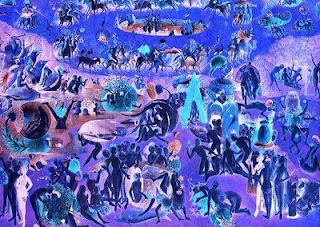Hedonism, Hedonist, Hedonistic
Western civilization has not been kind to the word hedonist, which as a result of the influence of ascetic religions connotes sinner before all other meanings. In philosophical circles, however, the term is much more neutral and has two distinguishable forms: descriptive and normative or prescriptive hedonism.
Descriptive hedonism is a theory according to which the ultimate reason why we human beings do anything, at the end of the day, is for the pleasure which we will derive or expect to derive from doing it. This form of hedonism is incapable of empirical refutation, for it essentially defines us as pleasure seekers and explains away all possible counter examples by reinterpreting the apparently non-hedonistic behavior in terms of pleasure. People who regard human beings as essentially animals, no more and no less, may find descriptive hedonism quite plausible. Others may find it demeaning. Given that it's a metaphysical theory, no one can demonstrate it to be true or prove it to be false by empirical means.
Consider the mother who toils away for her children, sacrificing all that she might have been and done for their sake. Or how about the soldier who courageously fights for his country and dies in the process? Are these not examples of virtuous self-sacrifice, of forgoing one's own pleasure in order to help other people?
Not according to the philosophical hedonist, who is determined to interpret everything in terms of pleasure. The mother acts as she does because she derives pleasure from seeing her children thrive as a result of her apparent sacrifice. The soldier agrees to fight because he enjoys the idea of being thought of as a hero. Construed in this way, descriptive hedonism is closely related to psychological egoism: ultimately we do what we do for ourselves. Apparent acts of altruism are really only apparent.
Normative or prescriptive hedonism denies that everyone acts according to the pleasure principle. However, the normative version of hedonism exhorts people to do so and deems them irrational when they fail to do so. Carpe diem could be interpreted as a version of normative hedonism, and it may seem to follow logically from a recognition of our mortality. Of course, carpe diem can also be interpreted in other ways (see existentialism...).
The term hedonism has come up in a few different discussions at the salon de parfum, especially in considering why we perfume ourselves. Why, after all, do we perfume ourselves? It may seem initially as though there are different reasons, but they all may come back, one way or the other, to pleasure, in the end. Either we ourselves enjoy wearing perfume, or we enjoy the reactions we get from other people when we wear perfume. Those reactions can range from compliments to varieties of, as they say in some fragrance community website forums, "panty-dropper" behavior.
Some people may also appreciate the feeling of prestige which they derive from being niche snobs or from developing a discriminating nose. Those would be further possible sources of pleasure, would they not? What about perfume as art appreciation? Do we like and wear perfume because it is art? Or do we wish to describe our olfactory pleasure as akin to art appreciation because it makes us feel sophisticated?
I do not subscribe to the general theories of hedonism explained above, but it seems pretty clear to me that the vast majority of perfume consumers are hedonistic, at least when it comes to their perfume. Either they wear it because of the direct sensory pleasure which they derive from the olfactory experience itself, or else they do so in anticipation of other pleasures which they will derive from the reactions they get or hope to get when they wear perfume. In this sense, perfume use appears to be essentially hedonistic—certainly our early encounters with perfume are—and attempts to elevate perfume to something "loftier" than a source of pleasure may be attempts to elevate the wearer to nobler plane.
Whatever we may say in our evaluations of a perfume—about its notes, its development, its longevity, and sillage—our final judgment of its value always seems to come down to whether we enjoy wearing the perfume. Sometimes in criticizing a new perfume a reviewer will write something to the effect that
Perfume should smell good.
This precept is prescriptive, and it appears to advocate hedonism, at least as regards perfume use.
What do you think about perfume use, my fragrant friends? Is it intrinsically hedonistic? Or should it be? Would you say that your own perfume use is hedonistic or not?


No comments:
Post a Comment
All relevant comments are welcome at the salon de parfum—whether in agreement or disagreement with the opinions here expressed.
Effective March 14, 2013, comment moderation has been implemented in order to prevent the receipt by subscribers of unwanted, irrelevant remarks.